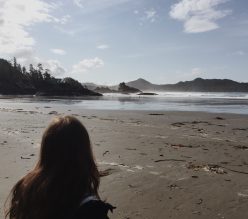Your task is to take the story about how evil comes into the world, the story King tells about the Witches’ convention in Chapter One of The Truth about Stories, and change it any way you want, except the ending. You can change to place, the people, the time – anything you want. But, your story must have the same moral – it must tell us how evil came into the world and how once a story is told, it cannot be taken back.
First, learn your story by heart, and then tell the story to your friends and family.
After you have told the story a few times, post a blog with your version of the story and some commentary on what you discovered about story telling.

I have a great story to tell you, it is the story of how evil came into the world. You might think you know this story, but I can assure you, you’ve never heard it quite like this before.
It happened in a place on this earth that no human has ever seen, at the beginning of time when the earth was mostly covered in water. Because there was no land at this point, there were also no humans. But there were human-like creatures of great intelligence, and great power. Mermaids we might call them, but not the type that sit on rocks and sing beautiful songs.
No, these mermaids are ancient creatures who know all the secrets of the sea, and the land which came after it. And it just so happens that they know all about how evil came into the world, because they are the ones responsible.
It happened like this: a few of the oldest and wisest mermaids from all over the world came together in a cave in the deepest part of the ocean. They were having contests of all sorts: Who could create the prettiest seashell? Who could summon the largest wave? Who could control an entire school of fish?
Finally the mermaids decided on one final contest: who could create the scariest thing in the entire ocean?
Each took their turn, trying to create the scariest thing, and each outdoing the last. This is actually how some of the scariest creatures in the ocean came to exist!
Finally there was only one mermaid left, who was one of the oldest and most mysterious mermaid in the ocean. And all this mermaid had was a story, but it was a terrible story about disease, murder, treachery, and blood magic. The list of awful things in this story seemed to go on and on.
The rest of the mermaids decided that this story was the winner, the scariest thing in the entire ocean. But they were not interested in having this story loose in the world, they all agreed that it was too terrible to live with. So they ordered the wise old mermaid to take the story back.
“I can not do that,” the old mermaid replied.
“Once a story is told it can not be called back. It will now be loose in the world forever.”
– – –
Storytelling was a new experience for me. For my whole life its been someone else telling the story and me being the listener. Even before I was about to tell my story to my parents, brother, and sister, we all had some fond memories to recall about our family’s own experiences with storytelling.
My dad would always tell us the story of “Pirate Pete” in the summers as we sat around a campfire at our cottage in Ontario. We would all howl with laughter every time he ended the story with explaining how Pirate Pete got his glass eye (“aye, a seagull pooped in me eye!”).
Reminiscing about the adventures of Pirate Pete oddly allowed me to draw some sharper observations about the nature of story telling. I noticed that the storyteller has a lot of freedom in how the story is delivered, but it is very important that the ending is delivered more or less the same.
I definitely added to, and rephrased certain parts of my story as I went along, but I was careful to make sure the ending was the same as how I initially intended for it to be. In the same way, with my dad’s Pirate Pete stories, we all counted on that same ending to make us laugh.
So whether the purpose of an ending is to make us laugh, or to give us something to think about, it seems that the endings of stories that we tell orally have a lot of power. So I guess that is really the point of the moral of our stories: be careful of the ones you tell, for once it is told it cannot be called back.
note: I was looking for a good picture of mermaids to accompany this post, but nothing really caught my eye. However, I did find this interesting article about mermaid legends. Check it out! There are stories about mermaids from cultures all over the world!
Works Cited
Radford, Benjamin, “Mermaids and Mermen: Facts and Legends”. Live Science: November 15 2014. Web. May 29 2016.
“Rolling Waves in Deep Ocean”. Shutterstock Photo. n.d. Web. May 29 2016.

Hi Natasha!
Great story! I have always associated mermaids with happiness, beauty and good magic, so it was very interesting for me to read your perspective. In his interview, Thomas King talks about maturation of the author and the affect it has on the story itself. Your story is a great example of that. You bring a whole other view and perspective to mermaids, it is not only more grown up, but it also has a darker twist to it.
Your idea of how the mermaids words were more terrifying than the scariest beasts in the ocean was great. I think we sometimes forget the power that words have. I enjoyed reading this, but I can also see it being a fun campfire story – your inspiration showed through! As you mentioned, stories told orally put great emphasis on the end of the story. When I think back to jokes my grandpa told me or stories from camp the ending is what could make or break the story. In some cases, I only remember the “punch line” but I could not tell you how to get there – just that I enjoyed the message from the story.
My question for you is do you think that hearing so many stories being told to you as a child influenced the tone or direction of this story?
Hi Alana!
I think my idea to have the story be about mermaids was really just a desperate effort on my part to make the story a little different from the original, but still keeping the events more or less the same. Creative writing is sometimes a struggle for me, so I thought “alright, if I change the characters and the location that should be good enough right?” haha. I played around with the idea of having the story be about aliens but mermaids seemed to work better. In the limited research I did I found that many cultures have myths and stories about mermaids where they’re actually pretty terrifying creatures! There were a lot of stories about mermaids steering sailors off course and dragging them down to the bottom of the ocean, scary stuff!
As for your question, the stories I was told as a kid were not a direct inspiration for the story, however they probably subconsciously effected how I wrote the story and how I told it. The stories we grow up with really do stick with us and shape our lives in many ways! Thank you for your comment!
– Natasha
You make some amazing points! I hadn’t thought about the ending of the story in the same way that you did but I completely agree. At the end of a story the final words resonate and wrap everything that happened. However, I also like King’s point about how to begin a story. Without a good beginning the end becomes irrelevant. Starting with “You’ll Never Believe What Happened” or “Once upon a time” can bring in the audience and keep them there until the very end. I find the beginning creates an intimacy in oral storytelling that the end takes advantage of and leaves an echo of a moral or meaning to the overall story.
Whether or not you feel like you’re a part of the story, hearing it provides a way to immerse audiences in the words and the beginning is that initial dive into it. You mentioned telling stories around a campfire and I’m sure that plenty of the people in this class can relate to that. I also can recall being read to or told stories at dinnertime, in bed before sleeping, or when taking a walk. I wonder what your thoughts are on the environment a story is told in and how that affects the story itself as well as those involved in it?
Hi Charlie,
I agree! The beginning and the end really do work together to make a story impactful. With regard to your question about stories and the environment they are told in, I think that the environment plays an important role in how the listener’s receive the story and how its told, but I also don’t think that you always have to have a specific kind of environment to tell a good story. Like I mentioned in my post, I’ve heard so many great stories told around campfires, which seemed to have created a very happy and pleasant atmosphere to hear a story. But I’ve also heard great stories told to me on skytrains, in classrooms, and at work. So in my experience, I think that the environment can really add to a story, but at the same time a great story can be told anywhere, and environment doesn’t always play a huge part in that.
– Natasha
Every Animal Pulled From the Deepest Part of the Ocean Had Plastic in Its Stomach And It’s Really Alarming https://www.knowledgeinflux.info/2019/06/every-animal-pulled-from-deepest-part.html